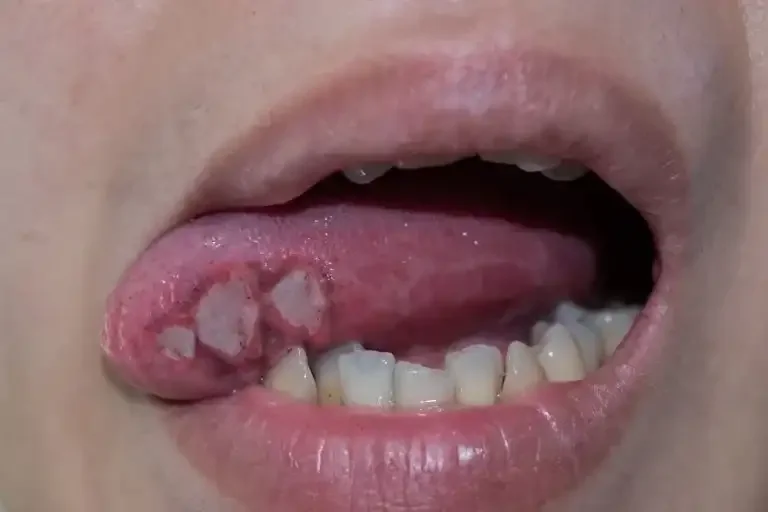Tongue cancer begins with the uncontrolled growth of cells on the tongue. The tongue extends from the neck into the mouth and is composed of nerves and muscles that support various functions, such as taste, speaking, eating, and swallowing. The tongue can be affected by various types of cancers, with tongue cancer often originating in the flat, thin squamous cells that cover its surface. This condition is referred to as squamous cell carcinoma.
When devising a treatment strategy, the doctor considers the type of cancer cells involved. Common treatments for tongue cancer include surgery and radiation therapy, while chemotherapy and targeted treatment may also be considered as alternative options.
Tongue Cancer Causes
The DNA of healthy tongue cells alters, which is the first sign of tongue cancer. The instructions for what a cell should perform are encoded in its DNA. When healthy cells would normally die as a part of their regular life cycle, the modifications signal the cells to grow out of control and to stay alive. As a result, many additional cells are produced. A development known as a tumour can develop from these cells. These cells have the potential to separate over time and spread to other parts of the body.
The changes that lead to tongue cancer are not usually easy to pinpoint. The human papillomavirus, or HPV, may play a role in certain throat-based tongue cancers. Sexual contact is the primary method of transmission for the widespread HPV virus.
The following are the most common tongue cancer causes:
- The most common cause of tongue cancer is the use of tobacco. Smoking, cigars, pipes, chewing tobacco, snuff, and any other tobacco products increase the risk of developing tongue cancer.
- Frequent and excessive drinking also increases the risk of tongue cancer. Combining alcohol and tobacco use further elevates this risk.
- Recent studies suggest that individuals exposed to certain types of HPV (human papillomavirus) are more likely to develop throat-based tongue cancer.
- Men are more prone to acquire tongue cancer compared to women, possibly due to higher rates of tobacco and alcohol use among men.
- The risk of tongue cancer is higher in people over 45, often as a result of years of cigarette and alcohol consumption.
- Poor oral hygiene can also contribute to tongue cancer, especially in individuals who use cigarettes and alcohol, increasing the danger significantly.
- Using immunosuppressive medications, such as those prescribed after an organ transplant, can weaken the immune system, potentially contributing to tongue cancer. Conditions like HIV infection can also be associated with an increased risk.
Types of Tongue Cancer
There are two sections on the tongue. The oral tongue is the front two-thirds of the tongue, while the base tongue is the remaining third. One kind of tongue cancer is oral tongue cancer. The most typical kind of cancer of the tongue is squamous cell carcinoma.
Tongue cancer that develops in the mouth differs from tongue cancer that develops in the throat.
- Cancer in the mouth – Tongue cancer in the mouth is referred to as oral tongue cancer. There may be immediate indications of tongue cancer in the mouth.
- Cancer in the throat – Tongue cancer in the throat is known as oropharyngeal tongue cancer. It could continue to develop before showing symptoms. When symptoms manifest, they may have a wide range of potential reasons. It can be difficult to notice and evaluate cancer towards the back of the tongue. These factors contribute to the cancer’s frequent delayed diagnosis. It is often discovered after the cancer cells have progressed to the neck’s lymph nodes.
Tongue Cancer Symptoms
The following tongue cancer signs may appear if it spreads to other areas of the oral cavity, such as the floor of the mouth, gums, jawbone, or deeper muscles:
- If the tumour spreads to the bone where the teeth are rooted or the tooth sockets, there may be loose teeth or improperly fitting dentures.
- If cancer spreads to any of the muscles that support mouth opening and closing, it may become difficult to open the mouth.
- When cancerous cells penetrate the nerves that regulate our sense of touch, an individual may experience numbness.
- A person may experience pain or have trouble swallowing if a tumour becomes large enough to interfere with eating or affect the muscles and nerves involved in swallowing.
Signs of Tongue Cancer
Tongue cancer may not initially exhibit symptoms. In certain cases, a doctor or dentist may detect tongue cancer early signs during a routine examination while searching for indications of mouth cancer. These tongue cancer early signs typically involve the presence of a non-healing sore on the tongue. Other potential signs include the development of a tumour or thickening on the tongue, as well as experiencing pain or bleeding in the mouth. Swollen lymph nodes in the neck could serve as an initial symptom of tongue cancer that has spread to the throat. Additional signs to watch for may include earaches, weight loss, and episodes of bloody coughing. Another tongue cancer early signs is the presence of a lump in the neck, throat, or the back of the mouth.
Other tongue cancer signs may include:
- The most common way that tongue cancer manifests is as a painful mouth sore that doesn’t go away after a few weeks.
- The most common colours of tongue patches are either red or white. White patches are less likely to be cancerous than red patches, but any patch in the mouth that persists for more than a few weeks should be biopsied by a professional.
- A sensation of having something stuck in your throat.
- When a tumour alters the way the tongue moves, it might cause difficulty in speaking.
- Swallowing, moving the jaws, or using the tongue might be painful or difficult.
- Cancerous oral growths can easily bleed when accidentally scratched while cleaning teeth or consuming certain foods.
- Dead cells inside the tumour can cause halitosis (bad breath), which is an unpleasant mouth odour that worsens as cancers grow larger.
Tongue Cancer Treatment
Radiation, chemotherapy, or both may be used in addition to surgery as a treatment for tongue cancer. An effective treatment plan is developed after a thorough evaluation of many criteria by your healthcare team. The cancer’s location and growth rate are two such factors. Your body’s overall cancerous status and the outcomes of any tests performed on the cancer cells may also be examined by the team. Age and general health are other factors that are taken into consideration. Here are the treatment options.
Surgery – Depending on the size of the cancer, a surgeon may remove all or part of your tongue during the procedure, known as a Glossectomy. A few healthy cells that surround your tongue will also be removed. You could require physical therapy and rehabilitation following surgery to address speech and swallowing issues.
Reconstructive Surgery – When a cancer procedure requires the removal of certain features of your mouth or face, doctors can reconstruct those tissues using this kind of surgery. Healthy bone or tissue from other sections of your body will be substituted for lost tongue, lip, and facial tissue.
Radiation Therapy – This treatment targets particular areas of the body with powerful energy beams from protons, X-rays, or other sources to destroy cancer cells.
Targeted Therapy – By targeting certain molecules within cancer cells, targeted therapy destroys the cancer cells. It can be used to treat tongue cancer that has returned or spread outside of the original tumour by medical professionals.
Chemotherapy – In order to stop cancer cells from growing or to eradicate any remaining cells, you will take medication either before or following cancer surgery.
Immunotherapy – Your doctor may recommend immunotherapy if other therapies aren’t working for your advanced tongue cancer. It manifests by assisting your immune system in identifying and eliminating cancerous cells.
Conclusion
If you suspect that you may have tongue cancer or are concerned about the risk factors, it is crucial to promptly seek medical attention. Early diagnosis and treatment of tongue cancer causes and symptoms offer the best chances of a successful outcome. Our team of doctors at Wockhardt Hospitals consists of recognised and highly qualified cancer care experts who can provide personalised guidance and recommendations based on your specific situation. Our team’s aim is to ensure that patients receive the best possible treatment for tongue cancer while minimising the risk of complications.
FAQs on Tongue Cancer
Q. What are the first signs of cancer of the tongue?
A lump or thickening in the tongue, continuous mouth ulcers, pain in the tongue, trouble swallowing or chewing, and abnormalities in speech or voice are usually the initial symptoms of tongue cancer. For prompt treatment, early diagnosis through routine dental exams is essential.
Q. Can cancer of the tongue be cured?
Q. How long can you live with tongue cancer?
Q. How is Stage 1 tongue cancer treated?
Q. What does oral cancer look like?
A lump or growth in the oral cavity, reddish or white areas within the mouth, or an open sore that refuses to heal are all signs of oral cancer.












